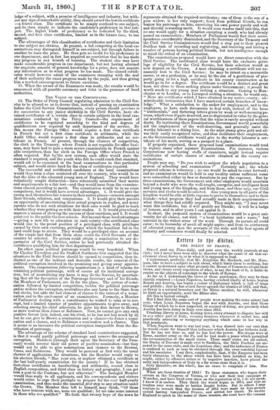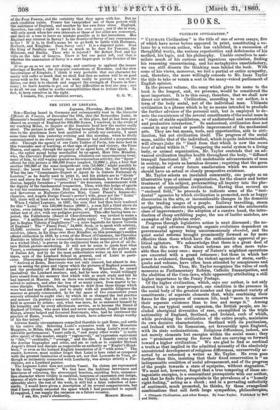Ittirrs in t#r Cititnr.
THE POLICY OF FICA/ME.
SHI—I read my Times daily, and pore over the weekly journals at my club ; but I never have been able to discover what the cause of all this ex- citement about Savoy is, or to what it is supposed to lead.
I understand, perfectly, that Mr. Kinglake, Mr. Roebuck, and. Mr. Hors- man, like to have a subject to talk about, which binds them to nothing, but I cannot understand upon what grounds the House of Commons adopts their views, and cheers every repetition of what, to say the least of it, is liable to render us the objects of contempt to the whole of Europe. As far as I understand the views of those gentlemen, they may be thus shortly rendered :—Louis Napoleon, having crushed liberty at home, beaten Russia and Austria, has begun a course of diplomacy which is full of traps and pitfalls ; that he has seized Savoy against the treaties of 1815, and that, as Savoy is a natural boundary and the Rhine another, he will, whenever he finds an opportunity, seize the Rhine also. All this is logical enough. But I find that the same sort of people were making the same outcry lad year, when Louis Napoleon began the war with Austria, and that those things of which he is now suspected, or accused of doing, are precisely what Austria has been doing in Italy ever since 1815. Crushing liberty at home, beating down every attempt to dispute her will in any other part of Italy, crossing frontiers whenever it suited her, and practically annexing or occupying anything which came in her way in that peninsula.
When Napoleon went to war last year, it WBA dinned into our ears that he would create for himself that influence which Austria has hitherto held. But he has not done so, and he has had the power. His troops were at Rome, another army on the Po, and he had made a peace which permitted the reconstruction of the small states. Those small states are all united, the Duchy of Tuscany is made over to Sardinia, the little Duchies are an- nexed to the same state, and the Legations also ; and the influence of France is confined to such as may be obtained through the ever-watchful Cavour and his associates. I say then, emphatically, that, if the Emperor had been fairly obnoxious to the abuse which has here been lavished on him, he might, either by offensive action or by negative inaction, have placed the unity and independence of Italy in a far worse state than it is. Italy therefore, on the whole, has no cause to complain of him. Has England ?
What are these treaties of 1815? To those statesmen who begun their
careers at the Congress of Vienna, or who saw their first campaign at Waterloo, and have lived ever since on the reputation of it, I do not speak. I know it is useless. They think the world began in 1815, and that no treaties ever were made or battles fought before. But to others I may venture to remark that the treaties of 1815 were made by four powers united having vanquished France, and settled her limits. To ens b 0 England to speak in the mime of those treaties, she must have the consent
of the Four Powers, and the certainty that they agree with her. But no such condition exists. France has vanquished one of these powers with the assistance of England, and another by her own force alone. England, therefore, has only a right to speak in her own name ; and if she is wise, will only speak when her own interests or those of her allies are concerned, and then in a tone to leave no mistake possible as to her intentions. Has England any interest in Savoy ? Is the frontier of Savoy of any consequence to her ? If it is, in God's name let us go forth to battle with Horsman, Roebuck, and Kinglake. Does Savoy care? It is a disputed point. Does the King of Sardinia care ? Not so much as he does for Tuscany, the Milanese, and Emilia. Then who is injured ? Sir Robert Peel and his villa on the lake of Geneva. There is but one point left, and that is whether the annexation of Savoy is a sure finger-post to the frontier of the Rhine.
If we go on as we are now doing, and continue to applaud the insane ntterings of Roebuck, the dyspeptic contortions of Horsman, and the slow lucubrations of Kinglake, I think it very probable that our character for sanity will suffer so much that we shall find that no nation will be on good terms with us for long. But if we wish really to prevent a war on the Rhine, our duty is to cherish and support the strength of Prussia in Ger- many; to leave Austria to get out of her difficulties as best she may ; and to do all we can rather to soothe susceptibilities than to irritate them. In fact, to keep ourselves in the right. I remain, Sir, your obedient servant, G. G. W.



























 Previous page
Previous page